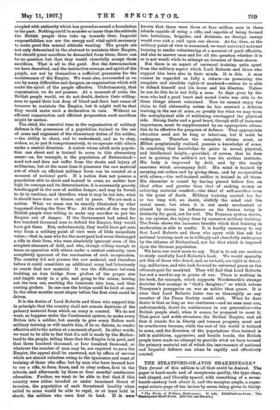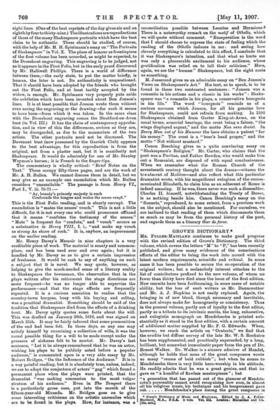THE STRATFORD-ON-AVON SHAKESPEARE.* THE format of this edition is all
that could be desired. The- paper is band-made and of sumptuous quality, the type clear, well shaped, and liberally spaced, with something of a seven- teenth-century look about it, and the margins ample, a super- royal octavo page of ten inches by seven being given to thirty- • The Works of William Shakespeare. 10 sob. Stdatford-on-Avon Tbe-
• Blakesposre Head Press. .R10 10s. nob IlsoSosta
eight lines. (One of the best reprints of the day gives six and an eighth by four to thirty-nine.) The illustrations are reproductions of those of the many Shakespeare portraits which have the best claim to be authentic,. These should be studied, of course, with the help of Mr. M. H. Spielmann's essay on" The Portraits of Shakespeare" in VoL X. The place of honour as frontispiece of the first volume has been accorded, as might be expected, to the Droeshout engraving. This engraving is to be judged, not as it appears in the First Folio, but in the early proof discovered by Mr. Halliwell Phillips. There is a world of difference between them,—the early state, to put the matter briefly, is human, the later is not. Its authenticity is unquestioned. That it should have been adopted by the friends who brought out the First Folio, and at least tacitly accepted by the widow, is enough. Mr. Spielmann very properly puts aside the subtleties which have been invented about Ben Jonson's lines. It is at least possible that Joneon wrote them without even seeing the engraving or the drawing—for such it seems to have been—from which it was taken. In the same class with the Droeshout engraving comes the Stratford-on-Avon bust (in Vol. III.) It has the claim of contemporary approba- tion, and in view of this the differences, serious as they are, may be disregarded, as due to the mannerism of the two artists. The other portraits need not be discussed. The Davenant bust (now possessed by the Garrick Club) appears to the best advantage, for this reproduction is from the original, not from a plaster cast, but it is manifestly not Shakespeare. It would do admirably for one of Mr. Stanley Weyman's heroes; it is French to the finger-tips.
The commentary is wholly critical: "Brief Notes on the Text." These occupy fifty-three pages, and are the work of Mr. A. IL Bullen. We cannot discuss them in detail, but we may give as an example one emendation which Mr. Bullen considers "unassailable." The passage is from Henry VI., Part I., V. ill. 70-71 :— " Ay, beauty's princely majesty is such Confounds the tongue and makes the senses rough."
This is the First Folio reading, and is clearly corrupt. The emendation is "mates the senses vouch." This is not a little difficult, for it is not every one whc could pronounce offhand that it means "confutes the testimony of the senses." "Mate" is frequent for " confute," and "vouch" occurs as a substantive in Henry VIII, L i., "and make my vouch as strong As shore of rock." It is, anyhow, an improvement on the earlier reading.
Mr. Henry Davey's Memoir in nine chapters is a very creditable piece of work. The material is scanty and common- place, and has been used over and over again; but it is handled by Mr. Davey so as to give a certain impression of freshness. It would be rash to say of anything on such a subject that it is novel. We may quote, however, as helping to give the much-needed sense of a literary reality to Shakespeare the townsman, the observation that in the plays written after his retirement the stags directions are more frequent—he was no longer able to supervise the performance—and that the stage effects are frequently repeated. It is a curious sensation to realise that the country-town burgess, busy with his buying and selling, was a practical dramatist. Something should be said of the tradition that Shakespeare died from the effects of a drinking bout. Mr. Davey aptly quotes some facts about the will. This was drafted on January 28th, 1616, and was signed on March 25th. It may be fairly inferred that some premonition of the end bad been felt. In those days, as any one may satisfy himself by examining a collection of wills, it was the rarest possible thing for a will to be made except under the pressure of sickness felt to be mortal. Mr. Davey's last sentence, "Let it be always remembered that he was an actor, wishing his plays to be publicly acted before a popular audience," is commented upon in a very able essay by Mr. Robert Bridges, "On the Influence of the Audience." It is in a way painful reading, but it is absolutely true, unless, indeed, we are to adopt the conjecture of actors' " gag" which found a permanent place when the plays were printed, that the dramatist "was making concession to the most vulgar stratum of his audience." Even in The Tempest there is a particularly gross case, put into the mouth of the fifteen-year-old Miranda. Mr. Bridges goes on to give some interesting criticisms on the artistic anomalies which are to be found in the playa. How, for instance, was a
reconciliation possible between Leontes and Hermione P There is a noteworthy remark on the motif of Othello, which we will quote without comment. "Exasperation is the word that I should choose to express the state of feeling which the reading of the Othello induces in me : and seeing . how cleverly everything is calculated to this effect, I conclude that it was Shakespeare's intention, and that what so hurts me was only a pleasurable excitement to his audience, whose gratification was relied. on to lull their criticism." Here, again, we see the "human" Shakespeare, but the sight costs us something.
M. Jusserand gives us an admirable essay on "Ben Joneon's Views on Shakespeare's Art." His text, so to speak, is to be found in these two contrasted sentences " Jonson was a romantic in his actions and a classic in his works" : Shake- speare was "a romantic in his plays, a conservative bourgeois in his life." The word " bourgeois " reminds us of a curious sarcasm which Jonson, for all his genuine love for Shakespeare, could not refrain from making. In 1596 Shakespeare obtained from Garter King-at-Arms, on the usual terms, armorial bearings, the crest being a falcon, "the wings displayed argent," and the motto Non sans droiet. In Every Man out of his Humour the hero obtains a patent " for his money." The crest is a "boar's head proper," and the motto "Not without mustard."
Canon Beecbing gives us a quite convincing essay on ." Shakespeare's Religion." Mr. Carter, who claims that the poet was a Puritan, and Father Bowden, who would make him out a Romanist, are disposed of with equal conclusiveness. When we remember what the Roman Church of the seventeenth century thought about the drama—witness the tre atment.of Moliere—and also reflect what this particular dramatist wrote, with his magnificent eulogium of the excom- municated Elizabeth, to claim him as an adherent of Rome is indeed amazing. If he was, there never was such a dissembler. Charles II. himself, notwithstanding the Treaty of Dover, is as nothing beside him. Canon Beeching's essay on the "Sonnets," reproduced, to some extent, from a previous work on the subject, should .also be mentioned. For ourselves, we are inclined to that reading of them which disconnects them as much as may be from the personal history of the poet, and regards them as a literary t)ur de force.











































 Previous page
Previous page